Planet Labs
description: an American private Earth imaging company that deploys small satellites to capture imagery of the Earth
16 results
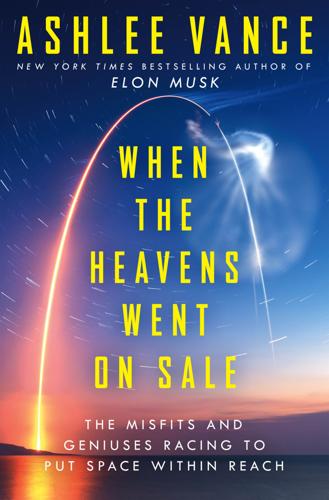
When the Heavens Went on Sale: The Misfits and Geniuses Racing to Put Space Within Reach
by
Ashlee Vance
Published 8 May 2023
The billionaires were about sending things and people to far-off places and abandoning the earth. Astra would embrace Earth. “We are going to enable a whole new frontier and a whole new group of pioneers to go build things in space,” he said. “Planet Labs took a decade and a billion dollars and thirty generations of Doves to make their system work. Well, there are four hundred space companies now that have been formed since Planet Labs. They’ve raised tens of billions of dollars. It’s a crazy amount of money. They are all focused on Earth. They are connecting things on Earth. They are observing things on Earth. They all have this common narrative around improving life on Earth.* The biggest play is to make all these ideas possible—to make it so someone with an idea in a dorm room can send something to space.
…
You could see thousands of SpaceX’s Starlink satellites arranged in a mathematical grid pattern around Earth. Hundreds more satellites from OneWeb and Planet Labs were tucked into the matrix. There were also debris fields stretching all the way around our planet. The most notable recent spray of debris had arrived in 2021, when Russia had chosen to shoot one of its own satellites with a missile to remind other countries that it could eliminate satellites on a whim. When the satellite was destroyed, it broke into more than 1,500 pieces. To make sure that their satellites don’t collide, companies such as SpaceX and Planet Labs pay LeoLabs to find their machines in space and keep track of their movements.
…
“Pete” Beck and, 207 espionage accusations and, 68 Google and, 58, 61, 64–65 growth of, 42–43 LADEE and, 57 lunar lander and, 55–57 Anisimov, Artiom, 403, 430–432, 447–448, 456, 460, 461, 465, 468, 476 Antares rockets, 29, 95, 104, 445, 493n “antigravity device,” 414 Antonov cargo plane, 446n Apollo mission, 42 Arecibo Observatory, 274 artificial intelligence (AI), image analysis and, 120–122 Astra in Alaska, 319–336, 338–354 attention given to, 317 engine tests at, 301–303 financial issues and, 326, 327, 370–374, 378, 379, 381–382 funding and, 365, 366, 383 goals of, 309–310, 364, 384 going public, 385–391, 393–394 growth of, 300 headquarters of, 397 Kemp and, 59 launch attempts and, 360–361, 375–376, 379–383, 391–393 “Launch Challenge” and, 369–370, 374–375 launch delays and, 326–334, 338 launch dress rehearsal and, 329–331 launch failures and, 335–336, 340–343, 345, 347, 349–354, 363–364 launch locations and, 303–304 launch process and, 345–347 moving rocket and, 302–306 name change to, 294 offices of, 310–311, 368 race to reach orbit and, 230 recent work of, 491–493 Rocket 2 and, 337–354 Rocket 3 and, 395 Rocket Lab and, 337–338, 349–350, 365 RV camp at, 355–358 security and, 301 Skyhawk space and, 367–369 static fire test and, 314–318 Atchison, Tom, 90–91 Ātea-1, 186–193, 195 autism spectrum, image analysts and, 119 Baiknour Cosmodrome, 442 Balls, 90 Beal, Andrew, 418 Beal Aerospace, 418 Bechtolsheim, Andy, 251n Beck, Peter Astra and, 332, 349–350, 381, 388 background of, 147–157 early days of Rocket Lab and, 183–186 early rocket experiments of, 159–166 Electron rocket and, 209–213 field trips with, 244 first launch and, 190–193, 226 founding of Rocket Lab and, 16, 137, 179–182 funding and, 203–204, 205–207, 209, 214, 224, 229 headquarters and, 230 Humanity Star and, 228 importance of to Rocket Lab’s success, 244–245 at IRL, 169–171 Kemp and, 254, 365–366 launch challenges and, 220–221 launch site and, 216–218 Merkel and, 232 military and, 187, 195–199, 202–203 motivations of, 245–246 Musk and, 241–243 new hires and, 236–238 Number 8 wire mentality and, 159 recent work of, 490 regulatory efforts and, 222–223 Rocket and, 180–181 Rocket Lab and, 138–141, 142–146 schedule and, 224 sounding rockets and, 178–179, 182 on “spiral of doom,” 189 stock options and, 235 success of, 17 third launch and, 239, 240–241 United States visit and, 172–177 US offices and, 234 work ethic of, 201 yacht work and, 166–167, 168–169 Beck, Russell, 148–151, 153 BeNaughty, 438 Beresheet lander, 476 Beta, 395, 426, 455 Beukelaers, Vincent, 101 Bezos, Jeff, 13, 17, 18–19, 420 Biblarz, Oscar, 162 Biefeld-Brown effect, 414 Biosphere 2, 274 Black Rock Desert, 90 BlackRock, 387 Blair, Tony, 84 Bloom Energy, 251–252 Bloomberg Businessweek, 470 Blue Origin, 17, 420–421, 449n Blum, Michael, 423–424 Boeing, 53, 443n, 454 Bolden, Charles, Jr., 423 Boshuizen, Chris arrival of at Ames, 62–63 departure from Planet Labs of, 488 founding of Planet Labs and, 100–102 goals of, 26 Lego satellite and, 87–88 PhoneSat project and, 89–96, 97 small satellites and, 98–100 Worden and, 50, 51 “bouncy houses of death,” 113 Boyd, Jack, 42 Branson, Richard, 13, 207, 421, 458 Brexit, 428 Brieschenk, Stefan, 211–212, 213 Brin, Sergey, 55, 65, 77, 104n, 111n, 298, 489, 490 Brockert, Ben, 282, 290–293, 307, 318, 324–330, 332, 341, 391 Bruno, Vita, 304 bungee jumping, 54–55 Buran space shuttle, 437 Burning Man, 253–254, 313–314, 357 Bush, George W., 53 Buzza, Tim, 7n, 9, 301n carbon fiber, 140, 166, 169–170, 186, 189, 198, 209, 263, 364, 426 Cardillo, Robert, 475 Carlson, Roger, 324, 326–333, 338, 343–347, 391 Carter, Doug, 170, 179, 184n Castle Air Force Base, 369 Ceperley, Dan, 482–483 Cheriton, David, 251n China, 112–115, 122 Classmates.com, 273 Clementine mission, 47 Clinton, Hillary, 297–298 Cold War, 145, 437, 444 Common and the Black Keys, 62 CORONA, 115–117, 461 Cosmogia, 96, 100 covid pandemic, 378–379, 389, 460, 476 Cowan-Sharp, Jessy Kate.
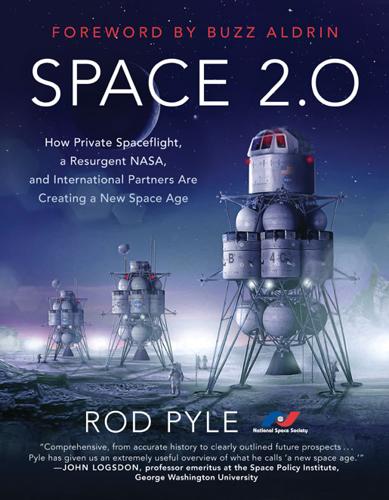
Space 2.0
by
Rod Pyle
Published 2 Jan 2019
Their client list includes companies small and large, with payloads ranging from national security satellites to tiny cubesats engineered by university students. They also provided some of the first commercial hardware to fly on the ISS. Planet Labs is another Space 2.0 success story. The company was founded in 2010 by a pair of NASA engineers to design, manufacture, and fly small satellites that would be capable of imaging Earth at a fraction of the cost of existing satellites. The company’s designs are based on the cubesat form factor. Planet Labs’ satellites are called 3U (3-unit) cubesats, and they are about four by four by twelve inches in size. They don’t require dedicated launches as traditional Earth-imaging satellites do, and can be included as secondary payloads—sometimes on NanoRacks hardware.
…
They don’t require dedicated launches as traditional Earth-imaging satellites do, and can be included as secondary payloads—sometimes on NanoRacks hardware. Today, a swarm of these cubesats creates a complete image of the Earth’s surface each day, available by subscription via a web-based interface. With almost two hundred satellites currently in orbit, their “fleet” is currently the largest ever flown by one company. Planet Labs cubesats ready to go. Image credit: NASA/Planet Labs Made In Space, Inc. is another interesting example of space entrepreneurism operating in a newly discovered market niche. The company was started in 2010 by four students who met at a Silicon Valley training program. The quartet created the first space-rated 3-D printers in a small lab set up in the NASA Ames Research Park in Mountain View, California.
…
We invested just before that fourth flight,” he says with a laugh. Jurvetson invested in Planet Labs after meeting an engineer who had moved from NASA to Google to work on cubesats. “I met a guy from NASA who was flying smartphones in rockets to see if they could survive the g-loading and so forth. They had already tested them in vacuum chambers and in other ways. Their argument was that they could make a cubesat and fly it close to Earth and get images as good as others that fly farther away.” Since Planet Labs built its business on inexpensive cubesats, using mostly off-the-shelf electronics and flying in low Earth orbit, its costs were far lower than traditional operators.
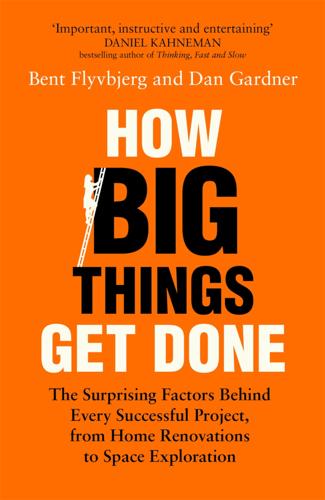
How Big Things Get Done: The Surprising Factors Behind Every Successful Project, From Home Renovations to Space Exploration
by
Bent Flyvbjerg
and
Dan Gardner
Published 16 Feb 2023
Tom Randall, “Tesla Flips the Switch on the Gigafactory,” Bloomberg, January 4, 2017, https://www.bloomberg.com/news/articles/2017-01-04/tesla-flips-the-switch-on-the-gigafactory; Sean Whaley, “Tesla Officials Show Off Progress at Gigafactory in Northern Nevada,” Las Vegas Review-Journal, March 20, 2016; Seth Weintraub, “Tesla Gigafactory Tour Roundup and Tidbits: ‘This Is the Coolest Factory in the World,’” Electrek, July 28, 2016, https://electrek.co/2016/07/28/tesla-gigafactory-tour-roundup-and-tidbits-this-is-the-coolest-factory-ever/. 20. Atif Ansar and Bent Flyvbjerg, “How to Solve Big Problems: Bespoke Versus Platform Strategies,” Oxford Review of Economic Policy 38, no. 2 (2022): 338–68. 21. Flyvbjerg, “Four Ways to Scale Up”; Fitz Tepper, “Satellite Maker Planet Labs Acquires BlackBridge’s Geospatial Business,” TechCrunch, July 15, 2015, https://techcrunch.com/2015/07/15/satellite-maker-planet-labs-acquires-blackbridges-geospatial-business/; Freeman Dyson, “The Green Universe: A Vision,” The New York Review of Books, October 13, 2016, 4–6; Carissa Véliz, Privacy Is Power: Why and How You Should Take Back Control of Your Data (London: Bantam, 2020), 154. 22.
…
Ithaca, NY: Cornell University Press. Teigland, Jon. 1999. “Mega Events and Impacts on Tourism; the Predictions and Realities of the Lillehammer Olympics.” Impact Assessment and Project Appraisal 17 (4): 305–17. Tepper, Fitz. 2015. “Satellite Maker Planet Labs Acquires BlackBridge’s Geospatial Business.” TechCrunch, July 15. https://techcrunch.com/2015/07/15/satellite-maker-planet-labs-acquires-blackbridges-geospatial-business/. Tetlock, Philip E. 2005. Expert Political Judgment: How Good Is It? How Can We Know? Princeton, NJ: Princeton University Press. Tetlock, Philip E., and Dan Gardner. 2015. Superforecasting: The Art and Science of Prediction.
…
But the use of replicability to shoot up the learning curve, accelerate delivery, and improve performance is woven into the company’s planning and delivery model.20 Space has long been dominated by big, complex one-off projects, and priced accordingly, with NASA’s James Webb Space Telescope—$8.8 billion, 450 percent over budget—just the latest example. But there are promising signs that the lessons of modularity are taking hold. To make satellites, a company called Planet (formerly Planet Labs, Inc.) uses commercial, off-the-shelf electronics, like those mass produced for cell phones and drones, made into 10 × 10 × 10 cm (4 × 4 × 4 inch) modules as cheaply and easily as possible. These are their Lego. They’re assembled into larger so-called CubeSat modules. Assemble three CubeSat modules and you have the electronics for one Planet Dove satellite.
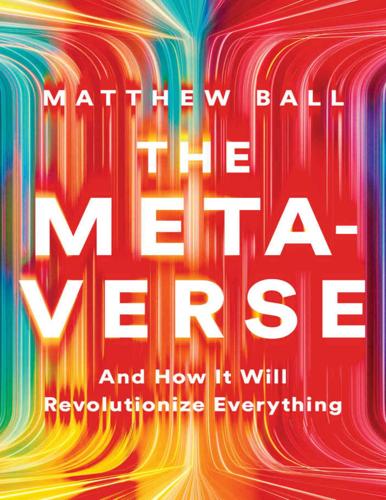
The Metaverse: And How It Will Revolutionize Everything
by
Matthew Ball
Published 18 Jul 2022
Today, the company’s software is primarily used by property owners to create vivid and navigable replicas of their real estate on sites such as Zillow, Redfin, or Compass, affording would-be renters, as well as construction professionals and other services providers, a better way to understand the space than allowed by blueprints, photographs, or even live tours. Soon we might use such scans to determine the placement of a wireless router or plant, test out a selection of different lamps (each one purchasable through Matterport), or to operate our entire smart home, including electricity, security, HVAC, and more. Another example is Planet Labs, which scans nearly the entire earth via satellite each day and across eight spectra bands, capturing not just high-resolution imagery, but details including heat, biomass, and haze. The company’s goal is to make the entire planet, in all its nuances, legible to software and to update its data on a daily to hourly basis.
…
Storied camera manufacturer Leica now sells $20,000 photogrammetric cameras that have up to 360,000 “laser scan set points per second,” and that are designed to capture entire malls, buildings, and homes with greater clarity and detail than the average person would ever see if they were physically on-site. Epic Games’ Quixel, meanwhile, uses proprietary cameras to generate environmental “MegaScans” comprising tens of billions of pixel-precise triangles. The satellite imaging company Planet Labs, mentioned in Chapter 7, performs scans of nearly the entire earth daily across eight spectra bands, enabling not just daily high-resolution imagery, but details including heat, biomass, and haze. To produce this imagery, it operates the second-largest fleet of satellites of any company in the world,* with over 150, many of which weigh less than 5 kilograms and are smaller than 10 × 10 × 30 centimeters.
…
Every photo from these satellites covers 20–25 square kilometers and is made up of 47 megapixels, with each pixel representing 3 × 3 meters. Roughly 1.5 GB of data is sent from each of these satellites per second and from an average distance of 1,000 kilometers. Will Marshall, the CEO and co-founder of Planet Labs, believes that the cost per performance of these satellites has improved by 1,000 times since 2011.6 Such scanning devices make it easier and cheaper for companies to produce high-quality “mirror worlds” or “digital twins” of physical spaces—and to use scans of the real world to produce higher-quality and less-expensive fantasy worlds.
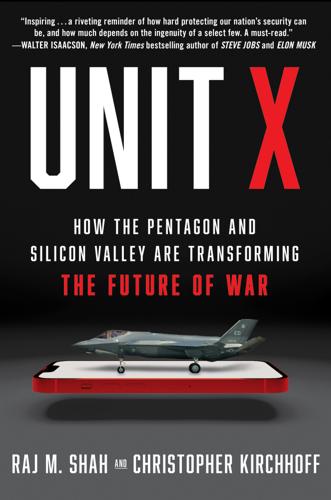
Unit X: How the Pentagon and Silicon Valley Are Transforming the Future of War
by
Raj M. Shah
and
Christopher Kirchhoff
Published 8 Jul 2024
What he cared most about was the ability to have satellites fly over North Korea more frequently, which in Pentagon parlance was called having a high “revisit rate.” Besides, the world of aerospace was changing. Space launch and satellite operations had once been controlled by NASA and the military, but the success of new players such as SpaceX, Planet Labs, Blue Origin, and others was already disrupting and transforming the fundamentals of the space industry. The government no longer shouldered the cost of building spacecraft as it had done with the Mercury and Apollo missions in the 1960s. By the 2010s, the government was just another customer of commercial launch companies that could get payloads into space cheaper than NASA.
…
Those drones gave Russia an asymmetrical advantage, as the only way for Ukraine to defeat them was to use Western-provided missiles that cost anywhere from $140,000 to $500,000 each. Illustrating how commercial technology levels the playing field for all, 82 percent of the Iranian drones’ components were made in the U.S. It was all part of the “flatter world” that Chris had written about in 2016. Silicon Valley tech companies leapt into the fray to support Ukraine. Planet Labs’ electro-optical satellites were surveilling the battlefield. HawkEye 360, a company Raj had invested in, intercepted Russian radio messages. Skydio, the first U.S. drone maker to become a unicorn, rushed its autonomous quadcopters to Ukraine infantry units. BlueHalo, mobilized by a $24 million Pentagon contract, delivered its Titan counter-drone systems to the battlefield, with antennas powered by machine learning algorithms.
…
payloads into space cheaper than NASA: Matthew Weinzierl and Mehak Sarang, “The Commercial Space Age Is Here,” Harvard Business Review, February 12, 2021, https://hbr.org/2021/02/the-commercial-space-age-is-here. Now that Datahub was up and running: The success of the Datahub pilot was disclosed publicly by Deputy Secretary Robert Work in 2016. See “Remarks by the Deputy Secretary of Defense at the In-Q-Tel CEO Summit,” San Jose, CA, February 25, 2016. See also “Deputy Secretary Work Visits Planet Labs,” February 25, 2016, https://www.defense.gov/Multimedia/Photos/igphoto/2001459490/. Lockheed deployed a SAR sensor on its SR-71 Blackbird: “Synthetic Aperture Radar: ‘Round the Clock Reconnaissance,’ ” Lockheed Martin, October 1, 2020, https://www.lockheedmartin.com/en-us/news/features/history/sar.html.
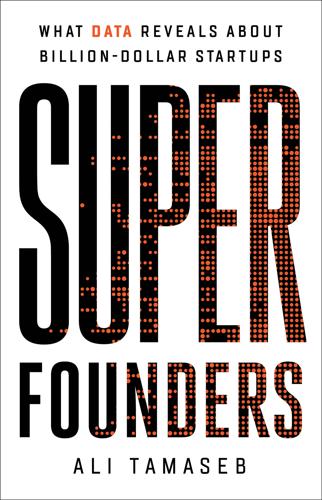
Super Founders: What Data Reveals About Billion-Dollar Startups
by
Ali Tamaseb
Published 14 Sep 2021
Imaging satellites used to be massive and cost tens of millions of dollars to build, let alone launch into orbit. Planet invented microsatellites, which weigh only eleven pounds each and measure as little as ten cubic centimeters. The founders of the company had worked at NASA for years on similar projects, but it still took them over three years to launch Planet Labs’ very first satellite, in November 2013. Because of this deep-tech innovation, Planet Labs has dispatched hundreds of satellites—the largest constellation of imaging satellites—to cover the entirety of Earth with their cameras. Planet sells the images globally to entities in both the public and private sectors, including governments, and, for example, agriculture, mining, and water businesses.
…
And as I’ll explain in a later chapter about how venture capitalists value startups, raising more money may result in increases in valuations ahead of when revenues can justify such valuations. System-integration companies were the most common, but deep-tech and medium-tech companies were more likely to achieve billion-dollar valuations. One example of a deep-tech company is Planet Labs, founded in 2010. It monitors the Earth continuously and can produce one picture each day from any location on the planet. How? The company developed very small satellites, equipped with high-quality cameras, that are launched into Earth’s orbit using rockets. Imaging satellites used to be massive and cost tens of millions of dollars to build, let alone launch into orbit.
…
To develop a new drug, a company needs to front the cost of labs, extensive equipment, and salaries for many, many years before there is any chance of revenue. Biotech companies also regularly pay for clinical trials, which can be very expensive. Companies building medical devices, healthcare services, hardware, material science, or energy products all face the same challenges. Planet Labs, which places imaging satellites into the Earth’s orbit and sells the data and insights collected by the satellites, has incredibly high capital needs. But those capital needs could create a form of defensibility. There are only so many companies that can raise enough capital to put hundreds of satellites in space; at some point for new entrants, raising all that money just to have a chance to compete becomes a problem.
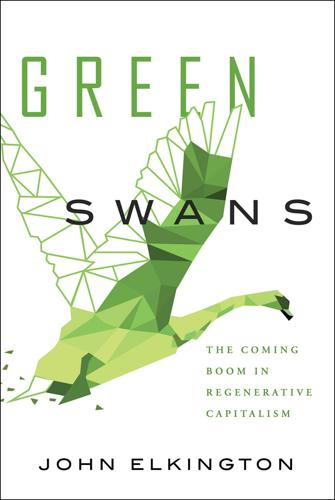
Green Swans: The Coming Boom in Regenerative Capitalism
by
John Elkington
Published 6 Apr 2020
Meanwhile, the big space agencies that have dominated space for years are no longer the only game in orbit. A couple of years ago, for example, I visited Planet Labs in San Francisco. They are part of a very different space industry now challenging NASA, the European Space Agency, and their Russian, Chinese, and Indian counterparts for space dominance. Clearly, all this activity is bound to have an impact on the amount of space junk. Here’s how Wired magazine put it: Just how much bigger will the problem get? SpaceX alone plans to send up nearly 12,000 small internet-beaming objects over time. OneWeb has designs on some 700 similar sats. Planet [Labs] just launched around 100 that take pictures of the Earth’s entire landmass every day.
…
See also change process stages; Future-Fit change approach Paradise, California, 137 Patriotic Millionaires, 132 Peak of Inflated Expectations stage, Gartner Hype Cycle, 174 Pearl, Morris, 132 penicillin, 103–104 People, Planet & Profit (3Ps), 30, 54 Perez, Carlota, 203, 235 PG&E power utility, 137 pharmaceutical industry, 231–232 Phelan, Ryan, 231–232 philanthropy, misuse of, 13 Piketty, Thomas, 60 Pinker, Steven, 28 placebo buttons, 43–46, 54 Plan B work, 234 Planet Labs, 114, 115 plant-based meat, 233 Plastic: A Toxic Love Story (Freinkel), 92–93 A Plastic Ocean (film), 92 plastics, as wicked problem, 92–97 Plateau of Productivity stage, Gartner Hype Cycle, 175 Pliny the Elder, 39 politics. See also democracy activism in, 227–228 breakers in, 221 different thinking, need for, 23–27 in future, 224 future-fit, 163–164 with Green Swan characteristics, 208–213 and need for systemic change, 14–15 underperformance in, 128 Polman, Paul, 19, 131 Polos, Stephen, 215 polymers industry, 92–97 Pope Francis, 128 population decline, 210–211, 222–223 Porter, Michael, 59, 150, 150f Positive Pursuits element, Future-Fit approach, 163 The Power of Unreasonable People (Elkington and Hartigan), 11 precision medicine, 179 predatory delay, 67 “Pre-Science” stage, in paradigm shift, 121–122, 123 product liability, 66 professional media, 227 profit(s), 27, 30–33, 47, 53–55, 128–129 Project Breakthrough, 34–36 Project Drawdown, 141, 232 Prosperity (Mayer), 49–50 Prosperity without Growth (Jackson), 56 psychoanalyzing business terms.
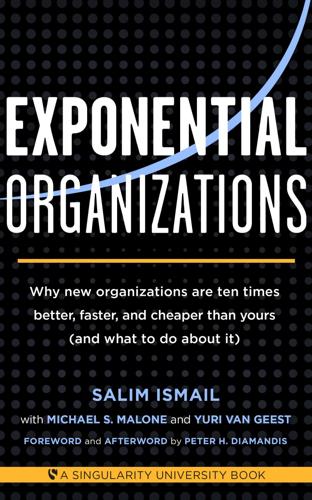
Exponential Organizations: Why New Organizations Are Ten Times Better, Faster, and Cheaper Than Yours (And What to Do About It)
by
Salim Ismail
and
Yuri van Geest
Published 17 Oct 2014
Today, twenty years later, a new breed of satellite companies—Skybox, Planet Labs, Nanosatisfi and Satellogic—are all launching nanosatellites (which are, essentially, the size of a shoebox). The cost per launch is about $100,000 per satellite—a fraction of the $1 billion Iridium incurred per launch for its constellation. More important, by launching a cluster of nanosatellites operating in a coordinated, meshed configuration, the capability of these new satellites blows away what the previous generation could do. For example, Planet Labs already has thirty-one satellites in orbit and plans to launch another one hundred during 2014.
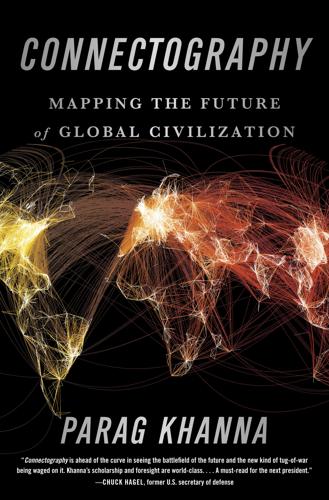
Connectography: Mapping the Future of Global Civilization
by
Parag Khanna
Published 18 Apr 2016
OPENSTREETMAP https://www.openstreetmap.org/ OpenStreetMap is a crowdsourced mapping platform maintained by a user community that constantly updates data on transportation networks, store locations, and myriad other content generated and verified through aerial imagery, GPS devices, and other tools. PLANET LABS https://www.planet.com/ Planet Labs uses a network of low-orbit satellites to capture the most current images of the entire earth and form composite digital renderings that can be used for commercial or humanitarian applications. SOURCEMAP http://www.sourcemap.com/ Sourcemap provides end-to-end visibility into supply chain data from raw materials to end consumers, allowing for visualization of risks, calculation of costs, and planning for resilience.
…
OpenStreetMap, for example, crowdsources street views from millions of members who can also tag and label any structure, infusing local knowledge and essential insight for everything from simple commuting to delivering supplies during humanitarian disasters.*1 We can now even insert updated imagery from Planet Labs’ two dozen shoe-box-size satellites into 3-D maps and fly through the natural or urban environment. All of this is coming to the palm of your hand. Google Maps is already by far the world’s most downloaded app; it represents the “ground truth” far better than Rand McNally. With the rise of the global sensor network dubbed the “Internet of Everything” (Internet of Things + Internet of People), our maps will perpetually update themselves, providing an animated view into our world as it really is—even the five thousand commercial aircraft in the sky and the more than ten thousand ships crossing the seas at any given moment.*2 These are the arteries and veins, capillaries and cells, of a planetary economy underpinned by an infrastructural network that can eventually become as efficient as the human body.

Exponential: How Accelerating Technology Is Leaving Us Behind and What to Do About It
by
Azeem Azhar
Published 6 Sep 2021
The bosses at Tesla understood that the prices of electric vehicles might decline on an exponential curve, and launched the electric vehicle revolution. The founders of Impossible Foods understood how the expensive process of precision fermentation (which involves genetically modified microorganisms) would get cheaper and cheaper. Executives at space companies like Spire and Planet Labs understood this process would drive down the cost of putting satellites in orbit. Companies that didn’t adapt to exponential technology shifts, like much of the newspaper publishing industry, didn’t stand a chance. We can visualise the gap by returning to our now-familiar exponential curve. As we’ve seen, individual technologies develop according to an S-curve, which begins by roughly following an exponential trajectory.
…
Abu Dhabi, UAE, 250 Acemoglu, Daron, 139 Acorn Computers, 16, 21 Ada Lovelace Institute, 8 additive manufacturing, 43–4, 46, 48, 88, 166, 169, 175–9 Adidas, 176 advertising, 94, 112–13, 116, 117, 227–8 AdWords, 227 aeroponics, 171 Afghanistan, 38, 205 Africa, 177–8, 182–3 Aftenposten, 216 Age of Spiritual Machines, The (Kurzweil), 77 agglomeration, 181 Air Jordan sneakers, 102 Airbnb, 102, 188 aircraft, 49–50 Alexandria, Egypt, 180 AlexNet, 33 Algeciras, HMM 61 Alibaba, 48, 102, 108, 111, 122 Alipay, 111 Allen, Robert, 80 Alphabet, 65, 113–14, 131, 163 aluminium, 170 Amazon, 65, 67–8, 94, 104, 108, 112, 122, 135–6 Alexa, 25, 117 automation, 135–6, 137, 139, 154 collective bargaining and, 163 Covid-19 pandemic (2020–21), 135–6 drone sales, 206 Ecobee and, 117 Go stores, 136 Kiva Systems acquisition (2012), 136 management, 154 Mechanical Turk, 142–3, 144, 145 monopoly, 115, 117, 122 Prime, 136, 154 R&D, 67–8, 113 Ami Pro, 99 Amiga, 16 Anarkali, Lahore, 102 anchoring bias, 74 Android, 85, 94, 117, 120 Angola, 186 Ant Brain, 111 Ant Financial, 111–12 antitrust laws, 114, 119–20 Apache HTTP Server, 242 Appelbaum, Binyamin, 63 Apple, 47, 62, 65, 85, 94, 104, 108, 112, 122 App Store, 105, 112, 115 chip production, 113 Covid-19 pandemic (2019–21), 222–3 data collection, 228 iOS, 85 iPhone, 47, 62, 85, 94, 105 media subscription, 112 watches, 112 APT33 hacker group, 198 Aral, Sinan, 238 Aramco, 108, 198 Armenia, 206–7 Arthur, William Brian, 110, 123 artificial intelligence, 4, 8, 31–4, 54, 88, 113, 249 academic brain drain, 118 automation, 125–42 data and, 31–2, 142 data network effect, 106–7 drone technology and, 208, 214 education and, 88 employment and, 126–7 healthcare and, 88, 103 job interviews and, 153 regulation of, 187, 188 arXiv, 59 Asana, 151 Asian Development Bank, 193 Aslam, Yaseen, 148 Assembly Bill 5 (California, 2019), 148 asymmetric conflict, 206 AT&T, 76, 100 Atari, 16 attack surfaces, 192–3, 196, 209, 210 Aurora, 141 Australia, 102, 197 automation, 125–42 autonomous weapons, 208, 214 Azerbaijan, 173, 206–7 Ballmer, Steve, 85 Bangladesh, 175 banking, 122, 237 Barcelona, Catalonia, 188 Barlow, John Perry, 184 Barrons, Richard, 195, 211 Bartlett, Albert, 73 batteries, 40, 51, 53–4, 250, 251 Battle of the Overpass (1937), 162 Bayraktar TB2 drone, 206 Bee Gees, 72 Bekar, Clifford, 45 Bell Labs, 18 Bell Telephone Company, 100 Benioff, Marc, 108–9 Bentham, Jeremy, 152 Berlin Wall, fall of (1989), 4 Bermuda, 119 Berners-Lee, Timothy, 55, 100, 160, 239 Bessen, James, 46 Bezos, Jeffrey, 135–6 BGI, 41 Biden, Joseph, 225 Bing, 107 biological weapons, 207, 213 biology, 10, 39, 40–42, 44, 46 genome sequencing, 40–41, 90, 229, 234, 245–7, 250, 252 synthetic biology, 42, 46, 69, 174, 245, 250 biopolymers, 42 bits, 18 Black Death (1346–53), 12 BlackBerry, 120 Blair, Tony, 81 Bletchley Park, Buckinghamshire, 22 blitzscaling, 110 Blockbuster, 138 BMW, 177 Boeing, 51, 236 Bol.com, 103 Bollywood, 181 Boole, George, 18 Bork, Robert, 114–15, 117, 119 Bosworth, Andrew, 233 Boyer, Pascal, 75 Boyle, James, 234 BP, 92, 158 brain, 77 Braudel, Fernand, 75 Brave, 242 Brazil, 202 Bremmer, Ian, 187 Bretton Woods Conference (1944), 87 Brexit (2016–20), 6, 168 British Broadcasting Corporation (BBC), 87, 129, 191 Brookings Institution, 130 BT, 123 Bulgaria, 145 Bundy, Willard Legrand, 149 Busan, South Korea, 56 business, 82, 92–124 diminishing returns to scale, 93, 108 economic dynamism and, 117 economies of scale, 50, 92 growth, 110–13 increasing returns to scale, 108–10 intangible economy, 104–7, 118, 156, 175, 180 linear value chains, 101 market share, 93–6, 111 monopolies, 10, 71, 94, 95, 114–24 network effect, 96–101 platform model, 101–3, 219 re-localisation, 11, 166–79, 187, 252, 255 state-sized companies, 11, 67 superstar companies, 10, 94–6 supply chains, 61–2, 166–7, 169, 175, 187, 252, 255 taxation of, 96, 118–19 Butler, Nick, 179 ByteDance, 28 C40 initiative, 189 Cambridge University, 127, 188 cancer, 57–8, 127 Capitol building storming (2021), 225 car industry, 93 carbon emissions, 35, 90, 251 Carlaw, Kenneth, 45 Carnegie, Andrew, 112 Carnegie Mellon University, 131 Catholic Church, 83, 88 censorship, 216–17, 224–6, 236 Central Intelligence Agency (CIA), 194 Cerebras, 34 cervical smears, 57–8 chemical weapons, 207, 213 Chen, Brian, 228 chewing gum, 78 Chicago Pile-1 reactor, 64 Chile, 170 China automation in, 127, 137 brainwave reading in, 152 Covid-19 pandemic (2019–21), 245 drone technology in, 207 Great Firewall, 186, 201 Greater Bay Area, 182 horizontal expansion in, 111–12 manufacturing in, 176 misinformation campaigns, 203 raw materials, demand for, 178 Singles’ Day, 48 social credit systems, 230 superstar companies in, 95 US, relations with, 166 chips, 19–22, 28–9, 48–9, 52, 113, 251 Christchurch massacre (2019), 236 Christensen, Clayton, 24 CIPD, 153 cities, 11, 75, 169, 179–84, 188, 255 Clegg, Nick, 225–6, 235 climate change, 90, 169, 187, 189, 251, 252 cloud computing, 85, 112 Cloudflare, 200 cluster bombs, 213 CNN, 185, 190 coal, 40, 65, 172 Coase, Ronald, 92 Coca-Cola, 93 code is law, 220–22, 235 cold fusion, 113–14 Cold War (1947–91), 194, 212, 213 collective bargaining, 147, 149, 154, 156, 162–5 Colombia, 145 colonialism, 167 Columbus, Christopher, 4 combination, 53–7 Comical Ali, 201 commons, 234–5, 241–3, 256 companies, see business comparative advantage, 170 complex systems, 2 compounding, 22–3, 28 CompuServe, 100 computing, 4, 10, 15–36, 44, 46, 249 artificial intelligence, 4, 8, 31–4, 54, 88 cloud computing, 85, 112 internet, 47–8, 55, 65, 84 Law of Accelerating Returns, 30–31, 33, 35 machining, 43 Moore’s Law, see Moore’s Law quantum computing, 35 transistors, 18–22, 28–9, 48–9, 52 conflict, 87, 189, 190–215 attack surfaces, 192–3, 196, 209, 210 cyberattacks, 11, 114, 140, 181, 187, 190–200, 209–14, 256 de-escalation, 212–13 drone technology, 11, 192, 204–9, 214, 256 institutional change and, 87 misinformation, 11, 191, 192, 200–204, 209, 212, 217, 225 new wars, 194 non-proliferation, 213–14 re-localisation and, 189, 193, 194, 209 consent of the networked, 223 Costco, 67 Coursera, 58 Covid-19 pandemic (2019–21), 12–13, 59, 78–9, 131, 245–9 automation and, 127, 135, 136 cities and, 183 contact-tracing apps, 222–3 gig economy and, 146 lockdowns, 12, 152, 176, 183, 246 manufacturing and, 176 misinformation and, 202–4, 247–8 preprint servers and, 60 recession (2020–21), 178 remote working and, 146, 151, 153 supply chains and, 169, 246 vaccines, 12, 202, 211, 245–7 workplace cultures and, 151, 152 cranks, 54 credit ratings, 162, 229 critical thinking skills, 212 Croatia, 145 Crocker, David, 55 crowdsourcing, 143–4 Cuba, 203 Cuban missile crisis (1962), 99, 212 cultural lag, 85 cyberattacks, 11, 114, 140, 181, 187, 190–200, 209–14, 256 CyberPeace Institute, 214 Daniel, Simon, 173–4 Dar es Salaam, Tanzania, 183 Darktrace, 197 data, 8, 11, 71, 217–19, 226–31, 235, 237–42, 256 AI and, 8, 32, 33, 58, 106 compensation for, 239 commons, 242 cyberattacks and, 196 doppelgängers, 219, 226, 228, 239 interoperability and, 237–9 network effects, 106–7, 111 protection laws, 186, 226 rights, 240 Daugherty, Paul, 141 DDT (dichlorodiphenyltrichloroe thane), 253 death benefits, 151 Dediu, Horace, 24, 30 deep learning, 32–4, 54, 58, 127 deforestation, 251 dehumanisation, 71, 154, 158 deindustrialisation, 168 Deliveroo, 154, 163 Delphi, 100 dematerialised techniques, 166, 175 Denmark, 58, 160, 199–200, 257 Deutsche Bank, 130 Diamandis, Peter, 5 Dickens, Charles, 80 digital cameras, 83–4 Digital Geneva Convention, 211 Digital Markets Act (EU, 2020), 122 digital minilateralism, 188 Digital Nations group, 188 Digital Services Act (EU, 2020), 123 diminishing returns, 93, 108 disinformation, see misinformation DoorDash, 147, 148, 248 dot-com bubble (1995–2000), 8, 108, 150 Double Irish tax loophole, 119 DoubleClick, 117 drone technology, 11, 192, 204–9, 214, 256 Dubai, UAE, 43 Duke University, 234 dystopia, 208, 230, 253 Eagan, Nicole, 197 eBay, 98, 121 Ecobee, 120 economies of scale, 50, 92 Economist, The, 8, 65, 119, 183, 239 economists, 63 Edelman, 3 education artificial intelligence and, 88 media literacy, 211–12 Egypt, 145, 186 Elance, 144 electric cars, 51, 69, 75, 173–4, 177, 250 electricity, 26, 45, 46, 54, 157, 249–50 see also energy Electronic Frontier Foundation, 184 email, 6, 55 embodied institutions, 82 employment, 10, 71, 125–65 automation, 125–42 collective bargaining, 147, 149, 154, 156, 162–5 dehumanisation and, 71, 154, 158 flexicurity, 160–61, 257 gig economy, 10, 71, 142–9, 153, 162, 164, 239, 252, 255 income inequality, 155–8, 161, 168 lump of labour fallacy, 139 management, 149–54, 158–9 protections, 85–6, 147–9 reskilling, 159–60 universal basic income (UBI), 160, 189 Enclosure, 234–5, 241 energy, 11, 37–8, 39–40, 44, 46, 172–4, 250 cold fusion, 113–14 fossil fuels, 40, 159, 172, 250 gravitational potential, 53 solar power, 37–8, 53, 65, 77, 82, 90, 171, 172, 173, 249, 250, 251 storage, 40, 53, 114, 173–4, 250, 251 wind power, 39–40, 52 Energy Vault, 53–4, 173 Engels, Friedrich, 81 Engels’ pause, 80, 81 environmental movement, 73 Epic Games, 116 estate agents, 100 Estonia, 188, 190–91, 200, 211 Etzion Airbase, Sinai Peninsula, 195 European Commission, 116, 122, 123 European Space Agency, 56 European Union, 6, 82, 147, 186, 226 Excel, 99 exogeny, 2 exponential gap, 9, 10, 67–91, 70, 89, 253 cyber security and, 193 institutions and, 9, 10, 79–88, 90 mathematical understanding and, 71–5 predictions and, 75–9 price declines and, 68–9 superstar companies and, 10, 94–124 exponential growth bias, 73 Exponential View, 8–9 externalities, 97 extremism, 232–4 ExxonMobil, 65, 92 Facebook, 27, 28, 65, 94, 104, 108, 122, 216–17, 218, 219, 221–2, 223 advertising business, 94, 228 censorship on, 216–17, 224–6, 236 collective bargaining and, 164 data collection on, 228, 239–40 extremism and, 233–4 Instagram acquisition (2012), 117, 120 integrity teams, 234 interoperability, 237–8 Kenosha unrest shooting (2020), 224 misinformation on, 201, 225 network effect and, 98, 223 Oculus acquisition (2014), 117 pay at, 156–7 Phan photo controversy (2016), 216–17, 224, 225 platform model, 101 polarisation and, 233 relationship status on, 221–2 Rohingya ethnic cleansing (2018), 224, 225 US presidential election (2016), 217 WhatsApp acquisition (2014), 117 facial recognition, 152, 208 Factory Act (UK, 1833), 81 Fairchild Semiconductor, 19, 21 fake news, 201–4 family dinners, 86 farming, 170–72, 251 Farrar, James, 148 fax machines, 97 Federal Aviation Administration (US), 236 feedback loops, 3, 13 fertilizers, 35, 90 5G, 203 Financial Conduct Authority, 122 Financial Times, 183 Finland, 160, 211–12 Fitbit, 158 Fiverr, 144 flashing of headlights, 83 flexicurity, 160, 257 flints, 42 flywheels, 54 Ford, 54, 92, 162 Ford, Gerald, 114 Ford, Henry, 54, 162 Ford, Martin, 125 Fortnite, 116 fossil fuels, 40, 159, 172 France, 100, 138, 139, 147, 163 free-market economics, 63–4 freelance work, 10, 71, 142–9 Frey, Carl, 129, 134, 141 Friedman, Milton, 63–4, 241 Friedman, Thomas, 167 FriendFeed, 238 Friendster, 26 Fudan University, 245 fund management, 132 Galilei, Galileo, 83 gaming, 86 Gates, Bill, 17, 25, 84 gender, 6 General Agreement on Tariffs and Trade, 87 General Data Protection Regulation (GDPR), 226 General Electric, 52 General Motors, 92, 125, 130 general purpose technologies, 10, 45–8 generative adversarial networks (GANs), 58 Geneva Conventions, 193, 199, 209 Genghis Khan, 44 GEnie, 100 genome sequencing, 40–41, 90, 229, 234, 245–7, 250, 252 Germany, 75, 134, 147 Giddens, Anthony, 82 gig economy, 10, 71, 142–9, 153, 162, 164, 239, 252, 255 Gilbreth, Lillian, 150 Ginsparg, Paul, 59 GitHub, 58, 60 GlaxoSmithKline, 229–30 global financial crisis (2007–9), 168 Global Hawk drones, 206 global positioning systems (GPS), 197 globalisation, 11, 62, 64, 156, 166, 167–71, 177, 179, 187, 193 internet and, 185 conflict and, 189, 193, 194 Glocer, Thomas, 56 Go (game), 132 GOAT, 102 Gojek, 103 Golden Triangle, 170 Goldman Sachs, 151 Goodfellow, Ian, 58 Google, 5, 35, 36, 94, 98, 104, 108, 115, 122 advertising business, 94, 112–13, 116, 117, 227 Android, 85, 94, 117, 120 chip production, 113 Covid-19 pandemic (2019–21), 222–3 data network effect, 106–7 death benefits, 151 Double Irish tax loophole, 119 Maps, 113 quantum computing, 35 R&D, 114, 118 vertical integration, 112–13, 116 X, 114 YouTube acquisition (2006), 112, 117 Gopher, 59, 100 GPT-3, 33 Graeber, David, 133–4 Grand Bazaar, Istanbul, 102 Graphcore, 34, 35 graphics chips, 34 Grateful Dead, The, 184 gravitational potential energy, 53 gravity bombs, 195 Greater Bay Area, China, 182 Greenberg, Andy, 199 Gross, Bill, 53 Grove, Andrew, 17 GRU (Glavnoje Razvedyvatel’noje Upravlenije), 199 Guangzhou, Guangdong, 182 Guardian, 8, 125, 154, 226, 227 Guiyang, Guizhou, 166 H1N1 virus, 75 Habermas, Jürgen, 218 Hard Times (Dickens), 80 Hardin, Garrett, 241 Harop drones, 207–8 Harpy drones, 207–8 Harvard University, 150, 218, 220, 221, 253 healthcare artificial intelligence and, 57–8, 88, 103 data and, 230, 239, 250–51 wearable devices and, 158, 251 Helsinki, Finland, 160 Herlev Hospital, Denmark, 58 Hinton, Geoffrey, 32, 126–7 HIPA Act (US, 1996), 230 Hitachi, 152 Hobbes, Thomas, 210 Hoffman, Josh, 174 Hoffman, Reid, 110, 111 Holmes, Edward, 245 homophily, 231–4 Hong Kong, 182 horizontal expansion, 111–12, 218 Houston Islam protests (2016), 203 Houthis, 206 Howe, Jeff, 143 Hsinchu, Taiwan, 181 Hughes, Chris, 217 Hull, Charles, 43 Human + Machine (Daugherty), 141 human brain, 77 human genome, 40–41, 90, 229, 234, 250 human resources, 150 Hussein, Saddam, 195 Hyaline, 174 hydroponics, 171 hyperinflation, 75 IBM, 17, 21, 47, 98 IDC, 219 Ideal-X, 61 Ikea, 144 Illumina, 41 Ilves, Toomas Hendrik, 190 ImageNet, 32 immigration, 139, 168, 183–4 Impossible Foods, 69 Improv, 99 income inequality, 155–8, 161, 168 India, 103, 145, 181, 186, 224, 253, 254 Indonesia, 103 Industrial Revolution (1760–1840), 79–81, 157, 235 informational networks, 59–60 ING, 178 innovation, 14, 117 Innovator’s Dilemma, The (Christensen), 24 Instagram, 84, 117, 120, 121, 237 institutions, 9, 10, 79–88, 90–91 path dependence, 86–7 punctuated equilibrium, 87–8 intangible economy, 104–7, 118, 156, 175, 180 integrated circuits, 19 Intel, 16–17, 19, 163 intellectual property law, 82 Intermediate-Range Nuclear Forces Treaty (1987), 237 International Alliance of App-Based Transport Workers, 164 International Court of Justice, 224 International Criminal Court, 208 International Energy Agency, 77, 82 International Labour Organization, 131 International Monetary Fund (IMF), 87, 167, 187 international organisations, 82 International Organization for Standardization, 55, 61 International Rescue Committee, 184 International Telecommunication Union, 55 internet, 7, 47–8, 55, 65, 72, 75, 84–5, 88, 115, 184–6 code is law, 220–22, 235 data and, 11, 32, 71 informational networks, 59–60 localisation, 185–6 lockdowns and, 12 network effect, 100–101 online shopping, 48, 61, 62, 75, 94, 102, 135 platform model and, 102 public sphere and, 223 standardisation, 55 Wi-Fi, 151 interoperability, 55, 120–22, 237–9, 241, 243, 256–7 iPhone, 47, 62, 85, 94, 115, 175 Iran, 186, 196, 198, 203, 206 Iraq, 195–6, 201, 209 Ireland, 57–8, 119 Islamic State, 194, 233 Israel, 37, 188, 195–6, 198, 206, 207–8 Istanbul, Turkey, 102 Jacobs, Jane, 182 Japan, 37, 152, 171, 174 Jasanoff, Sheila, 253 JD.com, 137 Jena, Rajesh, 127 Jio, 103 job interviews, 153, 156 John Paul II, Pope, 83 Johnson, Boris, 79 Jumia, 103 just in time supply chains, 61–2 Kahneman, Daniel, 74 KakaoTalk, 27 Kaldor, Mary, 194 Kapor, Mitchell, 99 Karunaratne, Sid, 140–41, 151 Kenosha unrest shooting (2020), 224 Keynes, John Maynard, 126, 158 Khan, Lina, 119 Khartoum, Sudan, 183 Kim Jong-un, 198 King’s College London, 179 Kiva Systems, 136 Kobo360, 145 Kodak, 83–4, 88 Kranzberg, Melvin, 254 Krizhevsky, Alex, 32–3, 34 Kubursi, Atif, 178 Kurdistan Workers’ Party, 206 Kurzweil, Ray, 29–31, 33, 35, 77 Lagos, Nigeria, 182 Lahore, Pakistan, 102 landmines, 213 Law of Accelerating Returns, 30–31, 33, 35 Laws of Motion, 20 learning by doing, 48, 53 Leggatt, George, 148 Lemonade, 56 Lessig, Larry, 220–21 Leviathan (Hobbes), 210 Li Fei-Fei, 32 life expectancy, 25, 26 light bulbs, 44, 157 Lime, 27 Limits to Growth, The (Meadows et al.), 73 linear value chains, 101 LinkedIn, 26, 110, 121, 237, 238 Linkos Group, 197 Linux OS, 242 Lipsey, Richard, 45 lithium-ion batteries, 40, 51 lithium, 170 localism, 11, 166–90, 252, 255 log files, 227 logarithmic scales, 20 logic gates, 18 logistic curve, 25, 30, 51, 52, 69–70 London, England, 180, 181, 183 London Underground, 133–4 looms, 157 Lordstown Strike (1972), 125 Lotus Development Corporation, 99 Luddites, 125, 253 Lufa Farms, 171–2 Luminate, 240 lump of labour fallacy, 139 Lusaka, Zambia, 15 Lyft, 146, 148 machine learning, 31–4, 54, 58, 88, 127, 129, 143 MacKinnon, Rebecca, 223 Maersk, 197, 199, 211 malaria, 253 Malaysia Airlines Flight 17 shootdown (2014), 199 Malta, 114 Malthus, Thomas, 72–3 malware, 197 Man with the Golden Gun, The (1974 film), 37 manufacturing, 10, 39, 42–4, 46, 166–7, 175–9 additive, 43–4, 46, 48, 88, 166, 169, 175–9 automation and, 130 re-localisation, 175–9 subtractive, 42–3 market saturation, 25–8, 51, 52 market share, 93–6, 111 Marshall, Alfred, 97 Massachusetts Institute of Technology, 18, 147, 202, 238 Mastercard, 98 May, Theresa, 183 Mayors for a Guaranteed Income, 189 McCarthy, John, 31 McKinsey, 76, 94 McMaster University, 178 measles, 246 Mechanical Turk, 142–3, 144, 145 media literacy, 211–12 meningitis, 246 Mexico, 202 microorganisms, 42, 46, 69 Microsoft, 16–17, 65, 84–5, 88, 98–9, 100, 105, 108, 122, 221 Bing, 107 cloud computing, 85 data collection, 228 Excel, 99 internet and, 84–5, 100 network effect and, 99 Office software, 98–9, 110, 152 Windows, 85, 98–9 Workplace Productivity scores, 152 Mill, John Stuart, 193 miniaturisation, 34–5 minimum wage, 147, 161 misinformation, 11, 191, 192, 200–204, 209, 212, 217, 225, 247–8 mobile phones, 76, 121 see also smartphones; telecom companies Moderna, 245, 247 Moixa, 174 Mondelez, 197, 211 Mongol Empire (1206–1368), 44 monopolies, 10, 71, 94, 95, 114–24, 218, 255 Monopoly (board game), 82 Montreal, Quebec, 171 mood detection systems, 152 Moore, Gordon, 19, 48 Moore’s Law, 19–22, 26, 28–9, 31, 34, 63, 64, 74 artificial intelligence and, 32, 33–4 Kodak and, 83 price and, 41–2, 51, 68–9 as social fact, 29, 49 superstar companies and, 95 time, relationship with, 48–9 Moravec, Hans, 131 Moravec’s paradox, 131–2 Motorola, 76 Mount Mercy College, Cork, 57 Mozilla Firefox, 242 Mumbai, India, 181 mumps, 246 muskets, 54–5 MySpace, 26–7 Nadella, Satya, 85 Nagorno-Karabakh War (2020), 206–7 napalm, 216 NASA (National Aeronautics and Space Administration), 56 Natanz nuclear site, Iran, 196 National Health Service (NHS), 87 nationalism, 168, 186 NATO (North Atlantic Treaty Organization), 191, 213 Netflix, 104, 107, 109, 136, 137, 138, 139, 151, 248 Netherlands, 103 Netscape Communicator, 6 networks, 58–62 network effects, 96–101, 106, 110, 121, 223 neural networks, 32–4 neutral, technology as, 5, 220–21, 254 new wars, 194 New York City, New York, 180, 183 New York Times, 3, 125, 190, 228 New Zealand, 188, 236 Newton, Isaac, 20 Nigeria, 103, 145, 182, 254 Niinistö, Sauli, 212 Nike, 102 nitrogen fertilizers, 35 Nixon, Richard, 25, 114 Nobel Prize, 64, 74, 241 Nokia, 120 non-state actors, 194, 213 North Korea, 198 North Macedonia, 200–201 Norway, 173, 216 NotPetya malware, 197, 199–200, 211, 213 Novell, 98 Noyce, Robert, 19 NSO Group, 214 nuclear weapons, 193, 195–6, 212, 237 Nuremberg Trials (1945–6), 208 O’Reilly, Tim, 107 O’Sullivan, Laura, 57–8, 60 Obama, Barack, 205, 214, 225 Ocado, 137 Ocasio-Cortez, Alexandria, 239 Oculus, 117 oDesk, 144 Ofcom, 8 Ofoto, 84 Ogburn, William, 85 oil industry, 172, 250 Houthi drone attacks (2019), 206 OAPEC crisis (1973–4), 37, 258 Shamoon attack (2012), 198 Standard Oil breakup (1911), 93–4 Olduvai, Tanzania, 42 online shopping, 48, 61, 62, 75, 94, 102, 135 open-source software, 242 Openreach, 123 Operation Opera (1981), 195–6, 209 opium, 38 Orange, 121 Organisation for Economic Co-operation and Development (OECD), 119, 167 Osborne Computer Corporation, 16 Osborne, Michael, 129 Osirak nuclear reactor, Iraq, 195–6, 209 Ostrom, Elinor, 241 Oxford University, 129, 134, 203, 226 pace of change, 3 pagers, 87 Pakistan, 145, 205 palladium, 170 PalmPilot, 173 panopticon, 152 Paris, France, 181, 183 path dependence, 86 PayPal, 98, 110 PC clones, 17 PeerIndex, 8, 201, 237 Pegasus, 214 PeoplePerHour, 144 PepsiCo, 93 Perez, Carlota, 46–7 pernicious polarization, 232 perpetual motion, 95, 106, 107, 182 Petersen, Michael Bang, 75 Phan Thi Kim Phuc, 216–17, 224, 225 pharmaceutical industry, 6, 93, 250 phase transitions, 4 Philippines, 186, 203 Phillips Exeter Academy, 150 phishing scams, 211 Phoenix, Arizona, 134 photolithography, 19 Pigou, Arthur Cecil, 97 Piketty, Thomas, 160 Ping An Good Doctor, 103, 250 Pix Moving, 166, 169, 175 PKK (Partîya Karkerên Kurdistanê), 206 Planet Labs, 69 platforms, 101–3, 219 PlayStation, 86 plough, 157 Polanyi, Michael, 133 polarisation, 231–4 polio, 246 population, 72–3 Portify, 162 Postel, Jon, 55 Postings, Robert, 233 Predator drones, 205, 206 preprints, 59–60 price gouging, 93 price of technology, 22, 68–9 computing, 68–9, 191, 249 cyber-weapons, 191–2 drones, 192 genome sequencing, 41–2, 252 renewable energy, 39–40, 250 printing press, 45 public sphere, 218, 221, 223 Pulitzer Prize, 216 punctuated equilibrium, 87–8 al-Qaeda, 205, 210–11 Qatar, 198 quantum computing, 35 quantum physics, 29 quarantines, 12, 152, 176, 183, 246 R&D (research and development), 67–8, 113, 118 racial bias, 231 racism, 225, 231, 234 radicalisation pathways, 233 radiologists, 126 Raford, Noah, 43 Raz, Ze’ev, 195, 209 RB, 197 re-localisation, 11, 166–90, 253, 255 conflict and, 189, 193, 194, 209 Reagan, Ronald, 64, 163 religion, 6, 82, 83 resilience, 257 reskilling, 159–60 responsibility gap, 209 Restrepo, Pascual, 139 Reuters, 8, 56, 132 revolutions, 87 Ricardo, David, 169–70, 177 rights, 240–41 Rise of the Robots, The (Ford), 125 Rittenhouse, Kyle, 224 Roche, 67 Rockefeller, John, 93 Rohingyas, 224 Rome, ancient, 180 Rose, Carol, 243 Rotterdam, Netherlands, 56 Rule of Law, 82 running shoes, 102, 175–6 Russell, Stuart, 31, 118 Russian Federation, 122 disinformation campaigns, 203 Estonia cyberattacks (2007), 190–91, 200 Finland, relations with, 212 Nagorno-Karabakh War (2020), 206 nuclear weapons, 237 Ukraine cyberattacks (2017), 197, 199–200 US election interference (2016), 217 Yandex, 122 S-curve, 25, 30, 51, 52, 69–70 al-Sahhaf, Muhammad Saeed, 201 Salesforce, 108–9 Saliba, Samer, 184 salt, 114 Samsung, 93, 228 San Francisco, California, 181 Sandel, Michael, 218 Sanders, Bernard, 163 Sandworm, 197, 199–200, 211 Santander, 95 Sasson, Steve, 83 satellites, 56–7, 69 Saturday Night Fever (1977 soundtrack), 72 Saudi Arabia, 108, 178, 198, 203, 206 Schmidt, Eric, 5 Schwarz Gruppe, 67 Second Machine Age, The (Brynjolfsson and McAfee), 129 self-driving vehicles, 78, 134–5, 141 semiconductors, 18–22, 28–9, 48–9, 52, 113, 251 September 11 attacks (2001), 205, 210–11 Shamoon virus, 198 Shanghai, China, 56 Shannon, Claude, 18 Sharp, 16 Shenzhen, Guangdong, 182 shipping containers, 61–2, 63 shopping, 48, 61, 62, 75, 94, 102, 135 Siemens, 196 silicon chips, see chips Silicon Valley, 5, 7, 15, 24, 65, 110, 129, 223 Sinai Peninsula, 195 Sinclair ZX81, 15, 17, 21, 36 Singapore, 56 Singles’ Day, 48 Singularity University, 5 SixDegrees, 26 Skydio R1 drone, 208 smartphones, 22, 26, 46, 47–8, 65, 86, 88, 105, 111, 222 Smith, Adam, 169–70 sneakers, 102, 175–6 Snow, Charles Percy, 7 social credit systems, 230 social media, 26–8 censorship on, 216–17, 224–6, 236 collective bargaining and, 164 data collection on, 228 interoperability, 121, 237–8 market saturation, 25–8 misinformation on, 192, 201–4, 217, 247–8 network effect, 98, 223 polarisation and, 231–4 software as a service, 109 solar power, 37–8, 53, 65, 77, 82, 90, 171, 172, 173, 249, 250, 251 SolarWinds, 200 Solberg, Erna, 216 South Africa, 170 South Korea, 188, 198, 202 Southey, Robert, 80 sovereignty, 185, 199, 214 Soviet Union (1922–91), 185, 190, 194, 212 Spain, 170, 188 Spanish flu pandemic (1918–20), 75 Speedfactory, Ansbach, 176 Spire, 69 Spotify, 69 Sputnik 1 orbit (1957), 64, 83 stagflation, 63 Standard and Poor, 104 Standard Oil, 93–4 standardisation, 54–7, 61, 62 Stanford University, 32, 58 Star Wars franchise, 99 state-sized companies, 11, 67 see also superstar companies states, 82 stirrups, 44 Stockholm International Peace Research Institute, 208 Stockton, California, 160 strategic snowflakes, 211 stress tests, 237 Stuxnet, 196, 214 Sudan, 183 superstar companies, 10, 11, 67, 94–124, 218–26, 252, 255 blitzscaling, 110 collective bargaining and, 163 horizontal expansion, 111–12, 218 increasing returns to scale, 108–10 innovation and, 117–18 intangible economy, 104–7, 118, 156 interoperability and, 120–22, 237–9 monopolies, 114–24, 218 network effect, 96–101, 121 platform model, 101–3, 219 taxation of, 118–19 vertical expansion, 112–13 workplace cultures, 151 supply chains, 61–2, 166–7, 169, 175, 187, 252 surveillance, 152–3, 158 Surviving AI (Chace), 129 Sutskever, Ilya, 32 synthetic biology, 42, 46, 69, 174, 245, 250 Syria, 186 Taiwan, 181, 212 Talkspace, 144 Tallinn, Estonia, 190 Tang, Audrey, 212 Tanzania, 42, 183 TaskRabbit, 144 Tasmania, Australia, 197 taxation, 10, 63, 96, 118–19 gig economy and, 146 superstar companies and, 118–19 Taylor, Frederick Winslow, 150, 152, 153, 154 Tel Aviv, Israel, 181 telecom companies, 122–3 Tencent, 65, 104, 108, 122 territorial sovereignty, 185, 199, 214 Tesco, 67, 93 Tesla, 69, 78, 113 Thailand, 176, 203 Thatcher, Margaret, 64, 163 Thelen, Kathleen, 87 Thiel, Peter, 110–11 3D printing, see additive manufacturing TikTok, 28, 69, 159–60, 219 Tisné, Martin, 240 Tomahawk missiles, 207 Toyota, 95 trade networks, 61–2, 166–7, 169, 175 trade unions, see collective bargaining Trading Places (1983 film), 132 Tragedy of the Commons, The (Hardin), 241 transistors, 18–22, 28–9, 48–9, 52, 113, 251 transparency, 236 Treaty of Westphalia (1648), 199 TRS-80, 16 Trump, Donald, 79, 119, 166, 201, 225, 237 Tufekci, Zeynep, 233 Turing, Alan, 18, 22 Turkey, 102, 176, 186, 198, 202, 206, 231 Tversky, Amos, 74 23andMe, 229–30 Twilio, 151 Twitch, 225 Twitter, 65, 201, 202, 219, 223, 225, 237 two cultures, 7, 8 Uber, 69, 94, 102, 103, 106, 142, 144, 145 Assembly Bill 5 (California, 2019), 148 engineering jobs, 156 London ban (2019), 183, 188 London protest (2016), 153 pay at, 147, 156 satisfaction levels at, 146 Uber BV v Aslam (2021), 148 UiPath, 130 Ukraine, 197, 199 Unilever, 153 Union of Concerned Scientists, 56 unions, see collective bargaining United Arab Emirates, 43, 198, 250 United Autoworkers Union, 162 United Kingdom BBC, 87 Biobank, 242 Brexit (2016–20), 6, 168 collective bargaining in, 163 Covid-19 epidemic (2020–21), 79, 203 DDT in, 253 digital minilateralism, 188 drone technology in, 207 flashing of headlights in, 83 Golden Triangle, 170 Google and, 116 Industrial Revolution (1760–1840), 79–81 Luddite rebellion (1811–16), 125, 253 misinformation in, 203, 204 National Cyber Force, 200 NHS, 87 self-employment in, 148 telecom companies in, 123 Thatcher government (1979–90), 64, 163 United Nations, 87, 88, 188 United States antitrust law in, 114 automation in, 127 Battle of the Overpass (1937), 162 Capitol building storming (2021), 225 China, relations with, 166 Cold War (1947–91), 194, 212, 213 collective bargaining in, 163 Covid-19 epidemic (2020–21), 79, 202–4 Cyber Command, 200, 210 DDT in, 253 drone technology in, 205, 214 economists in, 63 HIPA Act (1996), 230 Kenosha unrest shooting (2020), 224 Lordstown Strike (1972), 125 manufacturing in, 130 misinformation in, 202–4 mobile phones in, 76 nuclear weapons, 237 Obama administration (2009–17), 205, 214 polarisation in, 232 presidential election (2016), 199, 201, 217 presidential election (2020), 202–3 Reagan administration (1981–9), 64, 163 self-employment in, 148 September 11 attacks (2001), 205, 210–11 shipping containers in, 61 shopping in, 48 solar energy research, 37 Standard Oil breakup (1911), 93–4 taxation in, 63, 119 Trump administration (2017–21), 79, 119, 166, 168, 201, 225, 237 Vietnam War (1955–75), 216 War on Terror (2001–), 205 universal basic income (UBI), 160, 189 universal service obligation, 122 University of Cambridge, 127, 188 University of Chicago, 63 University of Colorado, 73 University of Delaware, 55 University of Oxford, 129, 134, 203, 226 University of Southern California, 55 unwritten rules, 82 Uppsala Conflict Data Program, 194 UpWork, 145–6 USB (Universal Serial Bus), 51 Ut, Nick, 216 utility providers, 122–3 vaccines, 12, 202, 211, 245–7 Vail, Theodore, 100 value-free, technology as, 5, 220–21, 254 Veles, North Macedonia, 200–201 Véliz, Carissa, 226 Venezuela, 75 venture capitalists, 117 vertical expansion, 112–13, 116 vertical farms, 171–2, 251 video games, 86 Vietnam, 61, 175, 216 Virological, 245 Visa, 98 VisiCalc, 99 Vodafone, 121 Vogels, Werner, 68 Wag!
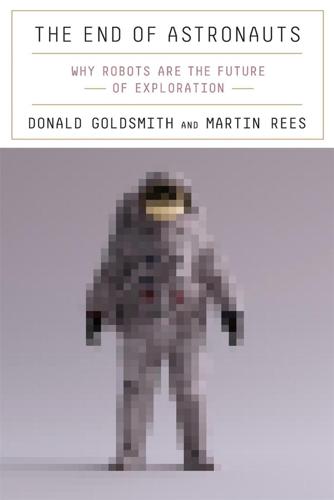
The End of Astronauts: Why Robots Are the Future of Exploration
by
Donald Goldsmith
and
Martin Rees
Published 18 Apr 2022
Equally useful, and now more abundant, are small satellites used to relay messages and data, for surveillance, and to bring rapid broadband service to remote parts of the world. Advances in miniaturization and changing economics have now enabled the launch of entire flotillas of small satellites—as many as one hundred on a single rocket. These satellites enable companies such as California’s Planet Labs to obtain daily images of the entire globe with a resolution sufficient to reveal road traffic, building sites, land use, and related information. Even greater advances lie in the near future, as SpaceX envisages that its Starlink project will place up to 40,000 satellites in orbit to create a network for enhanced global broadband communication.14 Other companies, including Amazon, have announced similar plans.
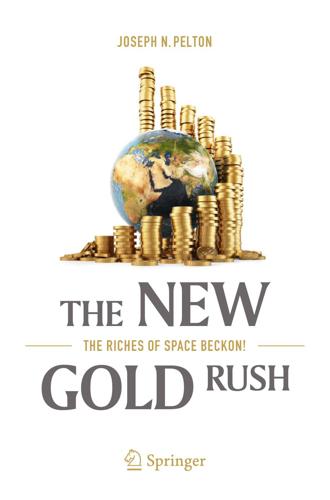
The New Gold Rush: The Riches of Space Beckon!
by
Joseph N. Pelton
Published 5 Nov 2016
Satellite constellationsA configuration of multiple satellites that are deployed over Earth in some sort of pattern or even random deployment so as to provide planetary coverage by a network of small satellites. Examples of these include Iridium and Globalstar for mobile satellite communications, Terra Bella and Planet Labs for remote sensing, and the planned OneWeb satellite constellation that is optimized for low latency Internet-based networking. All these systems and more are in low Earth orbit. Small satellitesGeneral term that refers to extremely small satellites weighing only a few grams or ounces, ranging from cubesats that might be in the 5–20 kg (11–44 pound) to quite capable commercial small satellites in constellations (i.e., twenty to even many hundreds of satellites blanketing Earth that would typically be in low Earth orbit) to provide communications, remote sensing or other services.
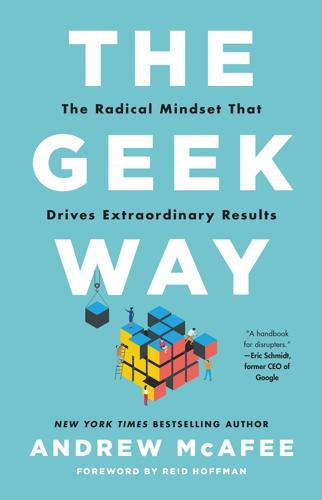
The Geek Way: The Radical Mindset That Drives Extraordinary Results
by
Andrew McAfee
Published 14 Nov 2023
Then they emailed us those packets and we stitched them into an image that was taken from space with a smartphone. And we were like, well, that phone cost $500. Most NASA spacecraft cost $500 million. What are those extra six zeros doing for us? The idea that it was possible to knock some zeroes off the cost of building useful satellites led Marshall to found Planet Labs with fellow former NASA scientists Chris Boshuizen and Robbie Schingler, in late 2010. Planet now scans the Earth every day with a network of more than two hundred satellites of its own design and sells the data and imagery it collects to governments and industry. Marshall estimates that Planet has something like a thousandfold cost advantage over other providers of space imagery.
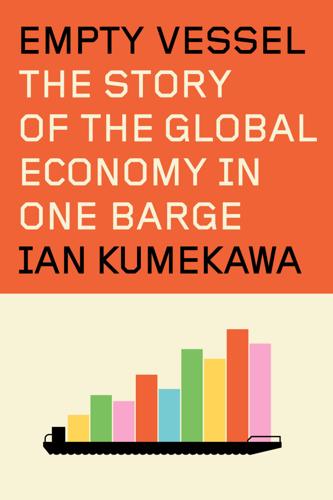
Empty Vessel: The Story of the Global Economy in One Barge
by
Ian Kumekawa
Published 6 May 2025
Flickr User It’s No Game, “Royal Courts of Justice,” 2014, Used under Creative Commons, creativecommons.org/licenses/by-sa/2.0. 33Gigi Sung and Jeff Blossom of the Center for Geographic Analysis, Harvard University 34Gigi Sung and Jeff Blossom of the Center for Geographic Analysis, Harvard University 35iStockPhoto.com / Modest Franco 36James Wild, 2017 37Wikimedia Commons / Flickr. User Sonse, “Sandwich Harbour, Walvis Bay,” 2017. Used under Creative Commons, creativecommons.org/licenses/by-sa/2.0. 38Reproduced from Jade Lennon, “Ship and Indian crew abandoned for over a year at Walvis Bay,” January 10, 2019, Medium 39Wikimedia Commons / Planet Labs Inc., “Shipwrecking in Alang, India, 2017-03-17,” 2017. Used under Creative Commons, creativecommons.org/licenses/by-sa/4.0. 40Ian Kumekawa, 2023 41Per Askergren, 2019 42Linda Halwaß, 2023 43Ian Kumekawa, 2023 A Note About the Author IAN KUMEKAWA is a historian at the Center for History and Economics at Harvard University.
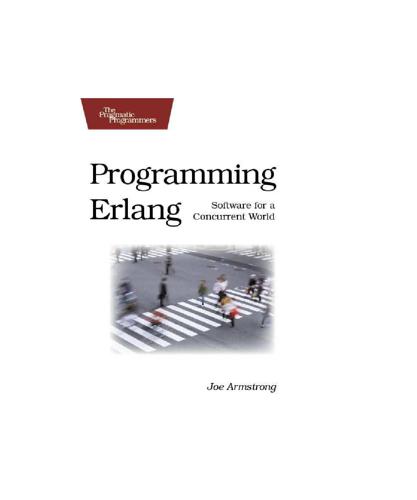
Pragmatic.Programming.Erlang.Jul.2007
by
Unknown
The usual approach is to start (for example) a web server and then install web server plug-ins. My approach was to back off one step and install an empty server. Later the plug-in turns the empty server into a web server. When we’re done with the web server, we might tell it to become something else. ∗. A planet-wide research network (http://www.planet-lab.org) Just make sure it’s compiled, and then we can tell process <0.57.0> to become a factorial server: 2> c(my_fac_server). {ok,my_fac_server} 3> Pid ! {become, fun my_fac_server:loop/0}. {become,#Fun<my_fac_server.loop.0>} Now that our process has become a factorial server, we can call it: 4> server5:rpc(Pid, {fac,30}). 265252859812191058636308480000000 Our process will remain a factorial server, until we send it a {become, Something} message and tell it to do something else.
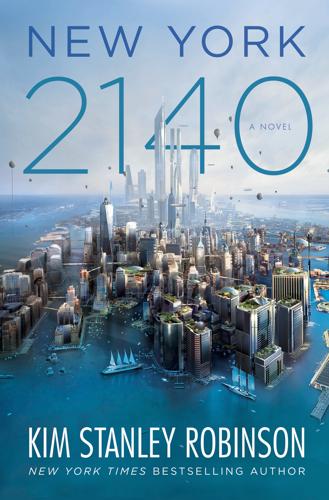
New York 2140
by
Kim Stanley Robinson
Published 14 Mar 2017
It was awesome to dive into such a complicated screen with the actual backdrop of lower Manhattan out the window, and combined with the cappuccino, and the flight down the river, it felt like dropping into a big breaking wave. The economic sublime! At pride of place in the center of my screen was a Planet Labs map of the world with sea levels indicated to the millimeter by real-time satellite laser altimetry. Higher sea levels than the average for the previous month were shaded red, lower areas blue, gray for no change. Every day the colors shifted, marking the water’s slopping around under the pull of the moon, the push of prevailing currents, the sweep of the winds, and so on.